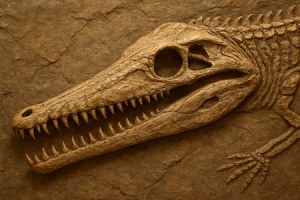Science
Fossil Discovery in Jaisalmer Unearths 201-Million-Year-Old Phytosaur

A remarkable discovery in Megha village, located in Jaisalmer, has unveiled a fossil belonging to a phytosaur species, dating back approximately 201 million years. This find marks it as one of the oldest fossils ever identified in India and the first phytosaur fossil to emerge from Jurassic rocks within the country.
The skeleton was unearthed near a pond in Megha village of the Fatehgarh subdivision. Villagers notified the local administration about the discovery on August 21, 2023, prompting an immediate investigation. Senior groundwater scientist Dr. Narayan Das Inkhaiya examined the site and confirmed its significance as a Jurassic-period fossil. Following this, Dr. V.S. Parihar, Dean of the Institute of Earth Sciences at JNVU Jodhpur, verified the find and is leading a comprehensive study with his research team.
Details of the Phytosaur Fossil
According to Dr. Parihar, the fossil belongs to a species of phytosaur, which are crocodile-shaped reptiles that thrived during the Late Triassic and Early Jurassic periods, predating dinosaurs. The discovered skeleton measures approximately 1.5 to 2 meters in length. Phytosaurs, often referred to as “tree lizards,” inhabited dense forests near rivers, and a comparison of the spine reveals strong similarities to modern crocodiles.
The excavation site has been secured with fencing to protect this significant find. The Geological Survey of India is set to conduct a full excavation and thorough analysis of the fossil. Dr. Inkhaiya highlighted the importance of this discovery, stating, “This is a major find where a nearly complete skeleton has been discovered. Further excavation may also reveal fossils of other creatures.”
Historical Context and Future Research
Jaisalmer has a rich history of prehistoric life, with notable discoveries including dinosaur footprints near Thaiyat and fossilized trees estimated to be 180 million years old found in Akal village, now part of the Wood Fossil Park. Certain areas, such as Jethwai hill, Thaiyat, and Lathi, have earned the nickname “villages of dinosaurs” due to the abundance of remains unearthed in the region.
Historically, mining activities in these areas have led to the destruction of several fossils. However, the government has since halted quarrying, prioritizing the protection of these valuable sites. As researchers continue to study the newly discovered phytosaur, there is hope that these efforts will yield further insights into the prehistoric ecosystems that once thrived in this part of India. The protection and study of this fossil could pave the way for a deeper understanding of the ancient life forms that roamed the Earth millions of years ago.
-

 World5 months ago
World5 months agoSBI Announces QIP Floor Price at ₹811.05 Per Share
-

 Lifestyle5 months ago
Lifestyle5 months agoCept Unveils ₹3.1 Crore Urban Mobility Plan for Sustainable Growth
-

 Science4 months ago
Science4 months agoNew Blood Group Discovered in South Indian Woman at Rotary Centre
-

 World5 months ago
World5 months agoTorrential Rains Cause Flash Flooding in New York and New Jersey
-

 Top Stories5 months ago
Top Stories5 months agoKonkani Cultural Organisation to Host Pearl Jubilee in Abu Dhabi
-

 Sports4 months ago
Sports4 months agoBroad Advocates for Bowling Change Ahead of Final Test Against India
-

 Science5 months ago
Science5 months agoNothing Headphone 1 Review: A Bold Contender in Audio Design
-

 Top Stories5 months ago
Top Stories5 months agoAir India Crash Investigation Highlights Boeing Fuel Switch Concerns
-

 Business5 months ago
Business5 months agoIndian Stock Market Rebounds: Sensex and Nifty Rise After Four-Day Decline
-

 Sports4 months ago
Sports4 months agoCristian Totti Retires at 19: Pressure of Fame Takes Toll
-

 Politics5 months ago
Politics5 months agoAbandoned Doberman Finds New Home After Journey to Prague
-

 Top Stories5 months ago
Top Stories5 months agoPatna Bank Manager Abhishek Varun Found Dead in Well









